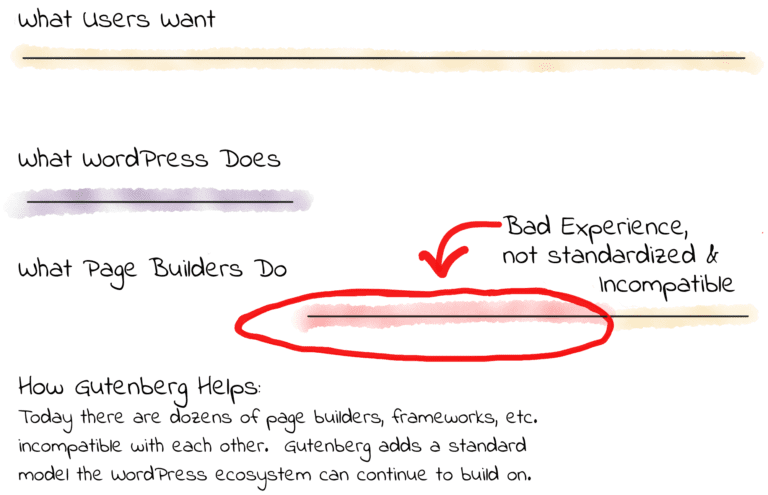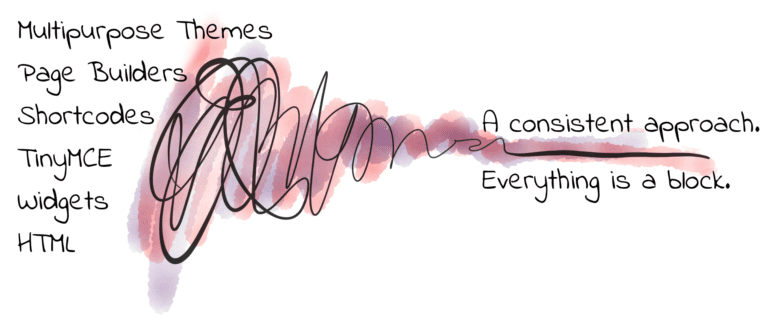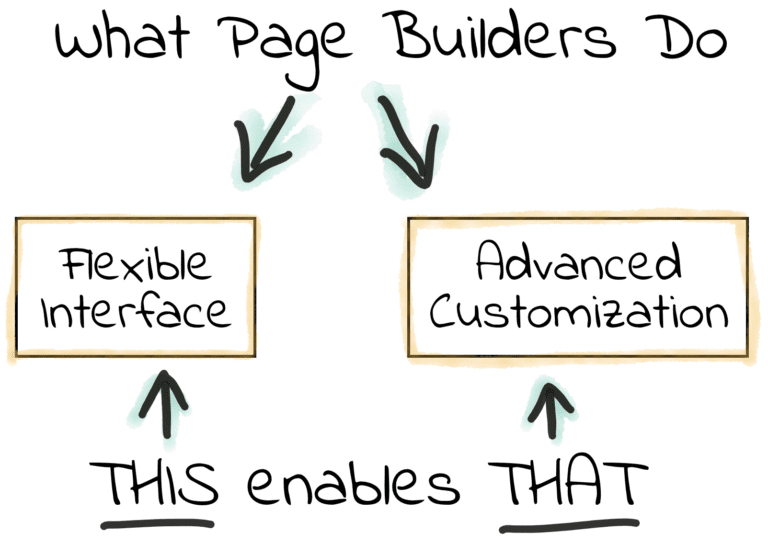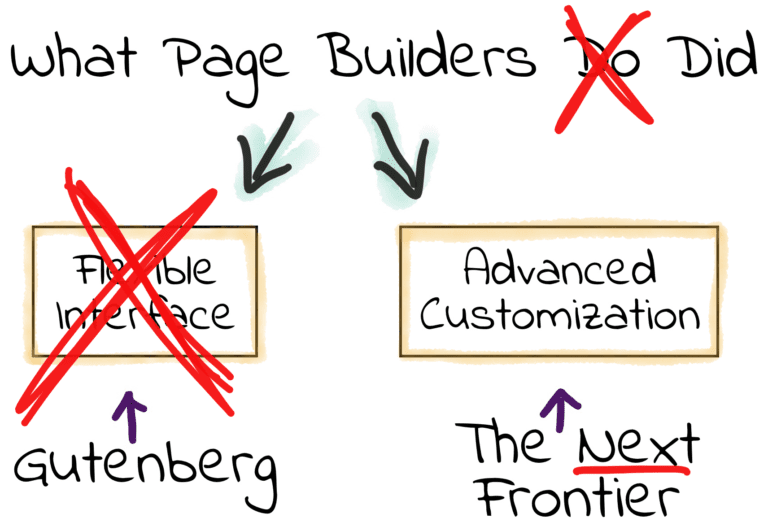Why WordPress Needs Gutenberg (& the Future of Page Builders)
WordPress is the largest CMS in the world, powering ~1/3 of all websites. The WordPress editing experience hasn’t changed much in over a decade and Gutenberg now aims to completely reinvent it. That’s a big deal.
It won’t be easy, but here’s 1) why it’s worth it and 2) what it means for page builders.
The Wild West
The WordPress ecosystem has been trying to improve the site editing experience since before plugins entered core in WordPress 1.2 (2004). There have been page builders, theme frameworks, front-end editors, etc. all trying to improve the WordPress experience.
Like every meaningful advancement, there are these wild west days of churn to find something that works. There have been a lot of great tools and learnings, but there has also been a lot of fragmentation across dozens of page builders, theme frameworks, etc. that don’t work well together.
If you’ve been around WordPress for a while you’ve seen some cringe-worthy examples of this. For example, a site with a bloated “multipurpose” theme…using a page builder…and using WooCommerce or some similar monstrosity. It’s a mess.
Why do we have page builders, theme frameworks, shortcodes, custom post types, and more? All to fill the gap between what WordPress core does and what users want.

WordPress is a Broken System
The WordPress ecosystem is built around a broken system with bloated themes, widgets, shortcodes, custom post types, menu items, page builders, etc. These DO NOT exist because they’re the best way to build a website. They DO exist because they’re compensating for WordPress’s shortcomings in fulfilling users’ needs.
Gutenberg aims to standardize and add these foundational elements that WordPress lacks.

While experienced users may be used to this (like you get used to a bad knee and don’t notice limping), it’s a bad experience for new users and it’s holding WordPress back.
This is why WordPress needs Gutenberg.
Will Gutenberg Kill Page Builders?
This is a question I see asked a lot. The answer is yes, but not how you think.
TL;DR “page builder” is a description of “how” page builders work, not “what” page builders do from a jobs-to-be-done (JTBD) perspective. There will always be a market for the what. It’s only the how that’s changing.
For example, page builders provide a flexible interface (modules, drag & drop, etc.) that gives customers advanced customization beyond WordPress core. The flexible interface is only relevant because it enables the customization. The customization is what customers want.

To reiterate, the only reason page builders provided the interface (via their own frameworks) was because WordPress didn’t. They had to provide the interface in order to give users what they want.
In a sense, Gutenberg frees page builders to focus on what customers actually pay them for: advanced customization beyond what WordPress core does (or will ever do).
Page Builders Will Evolve into Customizers…
Over the next few years as Gutenberg develops we’ll see page builders migrate from their old (own) frameworks to Gutenberg and evolve from page builders into customizers.
This should provide a major advantage as they can redeploy resources from maintaining (and supporting) their own frameworks to focus on building the best customization experience in innovative ways.

But will pure customization be a big enough market for customizers (page builders) to thrive in the future? Oh, yeah! Here’s why:
- Gutenberg will be in 100% of WordPress installs 5.0 and later–far that more any page builder today.
- A more flexible, easier to use core editing experience will only accelerate WordPress growth, meaning a larger TAM (total addressable market) for customizers.
- Customers are divinely discontent. Their expectations will continue to rise as they always have. Only
page builderscustomizers that leverage Gutenberg and focus resources on improving the customization experience will meet these growing expectations.
- Bloated multipurpose themes will die out as functionality shifts out of themes.
There will be thousands of new opportunities to make money with WordPress. The future is bright for those who adapt.
…And Some Page Builders Won’t Evolve at All
There will also be page builders that fail to make the transition. They’ll try to stay relevant by adding “Gutenberg compatibility” with their old page builder frameworks. This is like adding “electric compatibility” to gas-powered vehicles–it misses the point. Perfect reasoning from wrong premises.
But we can’t fault page builders for behaving this way. Switching to Gutenberg when you have a paying customer base using your old framework seems counterintuitive. Companies are supposed to leverage their advantages, not destroy them, right?
They’re sticking to what made them successful in the past, oblivious that it’ll doom them in the future. Sometimes you have to disrupt yourself before somebody else does. The hard part is knowing when.
This is the classic problem with incumbents. For example, despite being one of the first to mobile, Microsoft was too focused on what made it successful in the past and ported Windows to mobile (made Windows mobile compatible) rather than thinking mobile-first like Apple and Android. Sound familiar?
On Resistance to Gutenberg
There’s resistance to Gutenberg in the community, primarily by existing WordPress users used to the way things are. If you’re an existing WordPress user (especially a freelancer or agency) it can be scary to think about how this could impact your business. Some reasonable questions and concerns are:
- Will this make it so clients don’t need my services?
- I already have tools and a system that works for me, will this break them?
- I don’t have time to learn anything new.
- This just creates more work I don’t get paid for.
- The plugins and themes I rely on won’t work anymore.
…and dozens more.These are all reasonable concerns and the uncertainty of not having answers can create fear that manifests as resistance and anger, especially when livelihoods are at stake.
The WordPress team could have handled the approach and messaging around Gutenberg better. If existing users (especially WordPress professionals and plugins/theme authors) were brought along better, then Gutenberg would have more community support.
But this is very hard work and they’re human. They’re also volunteers dedicating a nontrivial amount of their limited time on this earth to improving a project we all rely on and use for free…so let’s cut them some slack, appreciate their efforts and contribute through constructive criticism. This is what makes WordPress great.
The great thing is that the only reason this is happening (people passionate about making WordPress better and people passionate about not ruining it) is because we all care deeply about WordPress. Remember, this is what makes WordPress great! Let’s get through it together.
Gutenberg still has a long way to go to earn the confidence of the community and it’ll take more than just polishing the experience. It’ll take listening to the community, addressing the concerns around Gutenberg like helping existing professionals adapt to the change, ensuring more plugins are compatible, etc. Even hosts should be involved and educating their customer bases.
This is a community project and it’ll take the community to make it successful. When it is, we’ll all have more of the growing WordPress pie.
Here’s to 50% and the next 15 years! ???